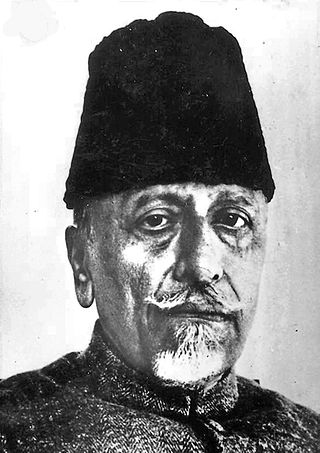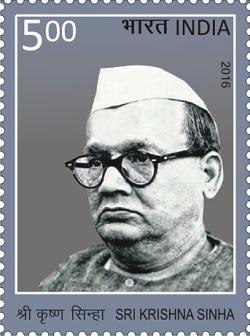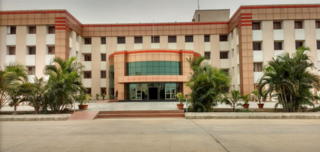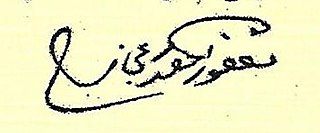
Jayaprakash Narayan, popularly referred to as JP or Lok Nayak, was an Indian independence activist, theorist, socialist and political leader. He is remembered for leading the mid-1970s opposition against Prime Minister Indira Gandhi, for whose overthrow he had called for a "total revolution". His biography, Jayaprakash, was written by his nationalist friend and the writer of Hindi literature, Rambriksh Benipuri. In 1999, he was posthumously awarded the Bharat Ratna, India's highest civilian award, in recognition of his social service. Other awards include the Magsaysay award for Public Service in 1965.

Abul Kalam Ghulam Muhiyuddin Ahmed bin Khairuddin Al-Hussaini Azad was an Indian independence activist, Islamic theologian, writer and a senior leader of the Indian National Congress. Following India's independence, he became the First Minister of Education in the Indian government. He is commonly remembered as Maulana Azad; the word Maulana is an honorific meaning 'Our Master' and he had adopted Azad (Free) as his pen name. His contribution to establishing the education foundation in India is recognised by celebrating his birthday as National Education Day across India.

Dr. Rajendra Prasad was an Indian politician, lawyer, Indian independence activist, journalist & scholar who served as the 1st President of India from 1950 to 1962. He joined the Indian National Congress during the Indian Independence Movement and became a major leader from the region of Bihar and Maharashtra. A supporter of Mahatma Gandhi, Prasad was imprisoned by British authorities during the Salt Satyagraha of 1931 and the Quit India movement of 1942. After the constituent assembly 1946 elections, Prasad served as 1st Minister of Food and Agriculture in the central government from 1947 to 1948. Upon independence in 1947, Prasad was elected as President of the Constituent Assembly of India, which prepared the Constitution of India and served as its provisional Parliament.

Gandhi Maidan is a historic ground in Patna, near the banks of the Ganges River, in Bihar, India. The Golghar falls to its west. During the period of 1824–1833, under British rule, it was used as a golf course and horse racing track and was called Patna Lawns. It is spread across 60 acres of land. It has a great political significance as well.

Shri Krishna Singh (Sinha) (21 October 1887 – 31 January 1961), also known as Shri Babu, was the first chief minister of the Indian state of Bihar (1946–61). Except for the period of World War II, Sinha was the chief minister of Bihar from the time of the first Congress Ministry in 1937 until his death in 1961. Along with the Desh Ratna Rajendra Prasad and Bihar Vibhuti Anugrah Narayan Sinha (A.N. Sinha), Sinha is regarded among the 'Architects of Modern Bihar'. He also led the Dalit entry into the Baidyanath Dham temple (Vaidyanath Temple, Deoghar), which reflected his commitment towards the upliftment and social empowerment of the Dalits. He was the first chief minister in the country to abolish the zamindari system. He underwent different terms of imprisonment for a total of about eight years in British India. Sinha's mass meetings brought hordes of people to hear him. He was known as Bihar Kesari for his lionlike roars when he rose to address the masses. His close friend and eminent Gandhian Bihar Vibhuti A.N. Sinha in his essay Mere Shri Babu wrote that, "Since 1921, the History of Bihar has been the history of the life of Shri Babu".
Abdul Ghafoor was an Indian freedom fighter and politician who served as the 13th Chief Minister of Bihar from 2 July 1973 to 11 April 1975; and served as cabinet minister in Rajeev Gandhi's government. He participated actively in freedom struggles and served jail terms.

Phulwari or Phulwari Sharif is Block and town in Patna district in the Indian state of Bihar. The current metro plan of Patna has one route in Phulwari Sharif.It includes in Patna Metropolitan Region and one of the fastest growing area of urban Patna.The civilisation of the city dates back to the days of inception of the Sufi culture in India. Phulwari Sharif had been frequented by most Sufi saints of that period.Phulwari sharif is famous for its islamic spiritual dargah and old mosques.

Basawon Singh or Basawan Singh also known as Basawon Sinha, was an Indian independence activist and a campaigner for the rights of the underprivileged, industrial labourers and agricultural workers.
Satyendra Narayan Sinha was an Indian politician and statesman, participant in the Indian independence movement, a leading light of Jaya Prakash Narayan's ‘complete revolution’ movement during the Emergency and a former Chief Minister of Bihar. Affectionately called Chhote Saheb, he was also a seven-time Member of Parliament from the Aurangabad constituency, a three-term Member of the Bihar Legislative Assembly, and a Member of the Bihar Legislative Council once. Regarded to be one of India's most influential regional people of the time, his reputation was synonymous with being a strict disciplinarian and tough taskmaster.

Anugrah Narayan Sinha, known as Bihar Vibhuti, was an Indian nationalist statesman, participant in Champaran Satyagraha, Gandhian & one of the architects of modern Bihar, who was the first Deputy Chief Minister and the Finance Minister of the Indian state of Bihar (1946–1957). He was also a Member of the Constituent Assembly of India, which was elected to write the Constitution of India and served in its first Parliament as an independent nation. He also held a range of portfolios including Labour, Local Self Government, Public Works, Supply & Price Control, Health and Agriculture. A.N. Sinha, affectionately called Anugrah Babu, was a very close associate of Mahatma Gandhi during the freedom struggle movement and worked with Bihar Kesari Sri Krishna Sinha to lead the Gandhian movement in Bihar. One of the leading nationalists in the Indian independence movement from Bihar after Dr Rajendra Prasad, he was elected as the Congress Party deputy leader in the state assembly to assume office as first Deputy Chief Minister cum Finance Minister of independent Bihar, and re-elected when the Congress Party won Bihar's first general election with a massive mandate in 1952.

Mohammad Yunus was the first Premier of British India's Bihar Province. During his career, the heads of provincial governments were called Prime Ministers. He governed for three months in 1937, during the state's first democratic election.
Bihar is a state located in the eastern part of India.
Syed Mahmud (1889–1971) was an Indian politician and senior leader in the Indian National Congress during the Indian independence movement and in post-independence India.
Abdul Bari (1892–1947), also known as Acha Bacha, was a descendant of Syed Ibrahim Malik Baya, an Indian academic and social reformer. He sought to bring about social reform in Indian society by awakening people through education. He had a vision of India free from slavery, social inequality, and communal disharmony. He took part in the freedom movement, for which he was killed.

Kedar Pandey was an Indian freedom fighter and Indian National Congress politician, who remained the Chief Minister of Bihar from March 1972 to 2 July 1973 and Minister of Railways in the Union Cabinet from 12 November 1980 to 14 January 1982 in the Government of India.

Maghfoor Ahmad Ajazi was a political activist from Bihar, prominent in the Indian independence movement.
Jagat Narain Lal was an Indian independence activist who played an influential role in the making of modern Bihar. As a member of the Indian National Congress and of the Constituent Assembly, he significantly contributed to the debates and issues that chartered the course of the Indian independence. Apart from being one of the foremost leaders of the Congress in Bihar, his association with the All India Hindu Mahasabha makes him a very important figure of India's nationalist history.

Maulana Mazharul Haque was an educator, lawyer, independence activist and freedom fighter of the Indian National Movement.











